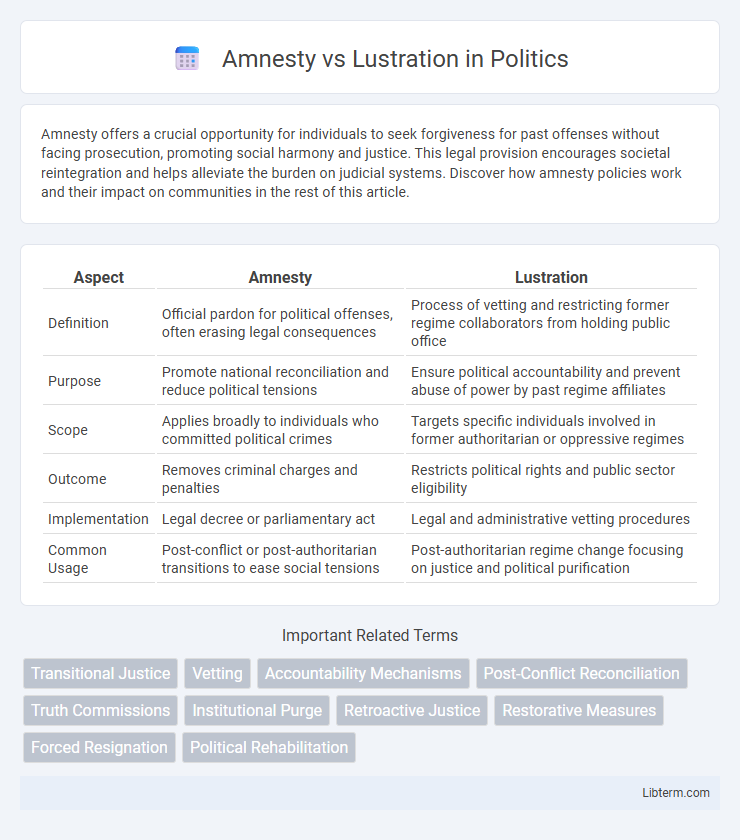Amnesty offers a crucial opportunity for individuals to seek forgiveness for past offenses without facing prosecution, promoting social harmony and justice. This legal provision encourages societal reintegration and helps alleviate the burden on judicial systems. Discover how amnesty policies work and their impact on communities in the rest of this article.
Table of Comparison
| Aspect | Amnesty | Lustration |
|---|---|---|
| Definition | Official pardon for political offenses, often erasing legal consequences | Process of vetting and restricting former regime collaborators from holding public office |
| Purpose | Promote national reconciliation and reduce political tensions | Ensure political accountability and prevent abuse of power by past regime affiliates |
| Scope | Applies broadly to individuals who committed political crimes | Targets specific individuals involved in former authoritarian or oppressive regimes |
| Outcome | Removes criminal charges and penalties | Restricts political rights and public sector eligibility |
| Implementation | Legal decree or parliamentary act | Legal and administrative vetting procedures |
| Common Usage | Post-conflict or post-authoritarian transitions to ease social tensions | Post-authoritarian regime change focusing on justice and political purification |
Understanding Amnesty and Lustration: Definitions and Origins
Amnesty refers to a governmental pardon for individuals who have committed offenses, often politically motivated, aiming to promote reconciliation and social stability. Lustration is the process of screening and excluding individuals associated with past regimes, typically authoritarian governments, from holding public office to ensure political transparency and integrity. Both concepts originated in post-conflict or transitional societies, with amnesty emphasizing forgiveness and lustration focusing on accountability and reform.
Historical Context: Why Societies Choose Amnesty or Lustration
Amnesty typically emerges in post-conflict societies aiming to promote reconciliation and social stability by forgiving past political offenses, as seen in South Africa after apartheid. Lustration processes are often chosen in transitional democracies like post-communist Eastern Europe to purge former regime collaborators from power and restore public trust in institutions. The decision between amnesty and lustration hinges on balancing justice, political pragmatism, and the societal need for historical accountability.
Goals and Objectives: What Each Policy Seeks to Achieve
Amnesty aims to promote national reconciliation by forgiving past offenses and fostering societal stability through legal pardon and reintegration of offenders. Lustration seeks to safeguard democratic institutions by identifying and removing individuals associated with previous authoritarian regimes from positions of power. Both policies pursue transitional justice but diverge in approach: amnesty prioritizes forgiveness and social harmony, while lustration emphasizes accountability and political cleansing.
Key Differences Between Amnesty and Lustration
Amnesty involves a governmental pardon that forgives individuals for past offenses, effectively erasing legal consequences and restoring rights, often used to promote national reconciliation after conflicts. Lustration is a political process aimed at vetting and restricting individuals associated with previous regimes from holding public office, focusing on transparency and accountability rather than forgiveness. The key difference lies in amnesty's focus on legal forgiveness and social reintegration, while lustration emphasizes political purification and prevention of influence by former regime collaborators.
Political and Social Implications of Amnesty
Amnesty in political contexts often serves to restore social cohesion by pardoning individuals involved in political offenses, thereby facilitating national reconciliation and reducing societal tensions. It can promote stability by preventing cycles of retribution and enabling reintegration of former adversaries into the political process. However, amnesty may also provoke controversy by undermining justice and accountability, potentially eroding public trust in institutions and impeding long-term democratic development.
The Impact of Lustration on Transitional Justice
Lustration significantly shapes transitional justice by enabling societies to address past abuses through vetting public officials linked to authoritarian regimes, promoting accountability and restoring public trust. This process facilitates institutional reforms and helps prevent recurrence of human rights violations by removing compromised actors from power. The balance between punitive measures and reconciliation efforts determines lustration's effectiveness in fostering durable democratic governance.
Case Studies: Global Examples of Amnesty
Amnesty programs have been implemented worldwide to promote national reconciliation and address past human rights violations, as seen in South Africa's post-apartheid process with the Truth and Reconciliation Commission granting amnesty in exchange for full disclosure. In contrast, lustration policies, such as those in post-communist Eastern Europe, involve the systematic vetting and exclusion of former regime collaborators from public office. Examples from countries like Argentina reveal amnesty used to halt prosecution of military personnel, while lustration measures in the Czech Republic demonstrate efforts to restore public trust through accountability.
Case Studies: Global Applications of Lustration
Lustration policies have been implemented across several post-communist countries including Poland, the Czech Republic, and Hungary, aiming to vet individuals who held positions in previous regimes and prevent their influence in new democratic governments. In Poland, the lustration process involved mandatory disclosure of communist-era affiliations for public officials, leading to political instability and legal challenges. Contrastingly, South Africa's Truth and Reconciliation Commission preferred amnesty over lustration, emphasizing restorative justice rather than systematic removal of former regime collaborators.
Debates and Controversies: Amnesty vs. Lustration
Debates surrounding amnesty versus lustration center on the balance between justice and reconciliation in post-conflict societies. Amnesty often faces criticism for enabling impunity by pardoning perpetrators, whereas lustration sparks controversy for potentially violating individual rights through broad political purges. The controversy intensifies as scholars and policymakers assess the long-term impacts on social cohesion, transitional justice, and the rule of law.
Policy Recommendations: Crafting Effective Transitional Justice
Amnesty and lustration serve distinct roles in transitional justice, with amnesty promoting reconciliation by forgiving past offenses, while lustration aims to prevent former regime collaborators from holding power, ensuring accountability and trust in new governance. Effective policy recommendations emphasize a balanced approach that incorporates targeted amnesty to foster social healing, alongside lustration measures that vet public officials to uphold democratic integrity and prevent impunity. Integrating comprehensive legal frameworks, transparent processes, and inclusive stakeholder engagement enhances legitimacy and reinforces the rule of law during transitional periods.
Amnesty Infographic

 libterm.com
libterm.com